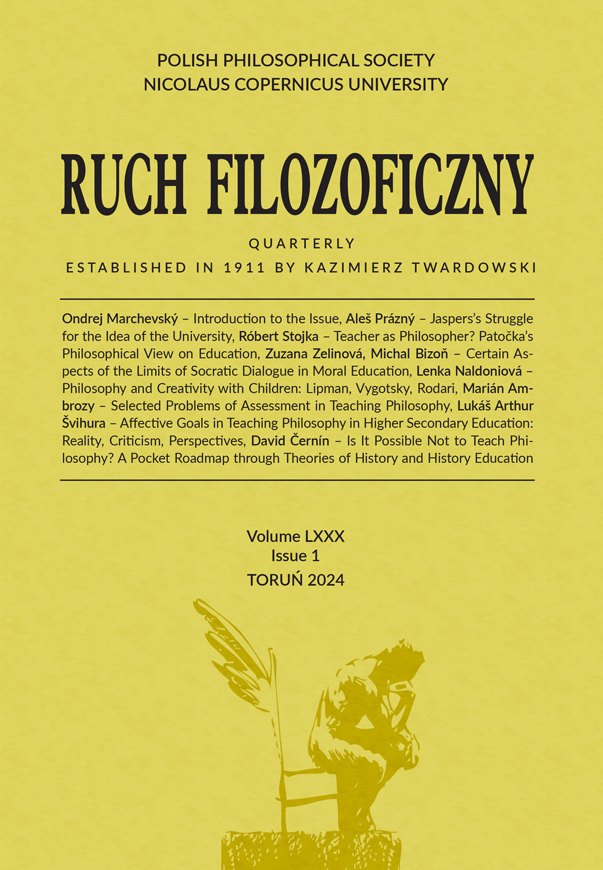Certain Aspects of the Limits of Socratic Dialogue in Moral Education
DOI:
https://doi.org/10.12775/RF.2024.04Słowa kluczowe
Socratic dialogue, models of Socratic education, moral education in schools, Plato, philosophical teachingAbstrakt
The main aim of our paper is to identify the potential limits of Socratic dialogue in moral education. These limits will be identified using a) the original ancient writings preserving several versions of Socrates’ dialogue, and b) modern writing on the Socrates’ dialogue in moral education. We will determine whether these limits are to be found in the writing of Plato or Xenophon, or rather in the problems and paradoxes of this type of education. We assume that a historical exploration of the original Socratic philosophy will help us to more easily identify the limits and problems in moral education. However, our intention is not to reject the Socratic dialogue as such, but merely to point out some of the potentially controversial aspects of its use in moral education.
Bibliografia
Aristotle. 1934. “Nicomachean Ethics”. W: Aristotle in 23 Volumes, Vol. 19, red. Harris Rackam. Harvard: Harvard University Press.
Beck A.G. Frederick. 1964. Greek Education, 450-350 B.C. London: METHUEN & CO LTD.
Bláha Petr. 2019. Nevýchovné eseje o výchově. Praha: Přestupní stanice.
Brestovanský Martin. 2019. Hodnoty, vzťahy a škola. Trnava: Typi Universitatis Tyrnaviensis.
Brickhouse C. Thomas, Nicholas D. Smith . 2009. “Socratic Teaching and Socratic Method”. In: The Oxford Handbook of Philosophy of Education, ed. Harvey Siegel, 177–194, Oxford: Oxford University Press.
Kanakis N. Iannis. 1984. Theoretische und empirische untersuchengen zur wirksamkeit der sokratischen Lehrstrategie. Heidelberg: Universität Heidelberg.
Kohák Erazim. 1993. Člověk, dobro a zlo. Praha: Ježek.
Komárik Emil, Adriana Maďarová, Malá Daniela. 2014. Charakter: Príspevok k rozvoju morálnej gramotnosti. Nitra: Univerzita Konštantína filozofa v Nitre.
Kuthanova Lucia. 2008. Sokratovský rozhovor: skrytá cesta rozvíjajúca základné kompetencie. Bratislava: Dr. Josef Raabe.
Mojžíšek Lubomír. 1988. Vyučovací metody. Praha: SPN (Státní pedagogické nakladatelství).
Neisser Barbara, René Saran. 2005. “How can Socratic Dialogue be used in Ethics Lessons in School?” In: Socratic Dialogue and Ethics, ed. Jens Peter Brune, Dieter Krohn, 189–192, Münster: LIT.
Nelson Leonard. 1949. “The Socratic Method”. W: The Socratic Method and Critical Philosophy: Selected Essays by Leonard Nelson, trans. Thomas K. Brown III, 1–43, New Haven: Yale University Press.
Pelcová Nadežda, Ilona Semrádová. 2014. Fenomén výchovy a etika učiteľského povolání. Praha: Karolinum.
Petrželka Josef. 2000. “Pedagogické aspekty sókratovského dialogu”. Pro-Fil 3, 27.9.2000, access 10.1.2022. https://journals.phil.muni.cz/profil/article/view/20220.
Plato. 1967-68. Platonis Opera I.-IV., trans. John Burnet, Oxford: Clarendon Press.
Porubjak Matúš. 2010. Vôľa (k) celku. Človek a spoločenstvo rečou Homéra a Theognida. Pusté Úľany: Schola Philosophica.
Matúš Porubjak, “Sókratovská pedagogika v Platónovom dialógu Menón”, Pro-fil 23 (2022), 1-15.
Raupach-Strey Gisela. 2000. „Die Bedeutung der Sokratischen Methode für den Ethik-Unterricht”. In: Das Sokratische Gespräch im Unterricht, ed. Dieter Krohn, Barbara Neisser, Nora Walter, 90–104, Frankfurt am Main: Verlag.
Raupach-Strey Gisela. 2012. Sokratische Didaktik. Die didaktische Bedeutung der Sokratischen Methode in der Tradition von Leonard Nelson und Gustav Heckmann, Münster: LIT.
Suvák Vladislav. 2014. “Sókratovská therapeia: Úloha Sókrata”. Filozofia 3: 824–834.
Turek Ivan. 2014. Didaktika, Bratislava: Wolters Kluwer.
Xenophon. 1971 Memorabilia, Symposium, Apologia Socratis, przel. Edgar Cardew Marchant, Oxford: Clarendon Press.
Zelinová Zuzana. 2019. “Je sokratovská výchova aktuálna aj v súčasnosti? ”. Pedagogika.sk, 3: 223–231.
Wellman R. Richard. 1976. “Socratic Method in Xenophon”. Journal of the History of Ideas 2: 307– 318.
Pobrania
Opublikowane
Jak cytować
Numer
Dział
Licencja
Prawa autorskie (c) 2023 Zuzana Zelinová, Michal Bizoň

Utwór dostępny jest na licencji Creative Commons Uznanie autorstwa – Bez utworów zależnych 4.0 Międzynarodowe.
Statystyki
Liczba wyświetleń i pobrań: 676
Liczba cytowań: 0



